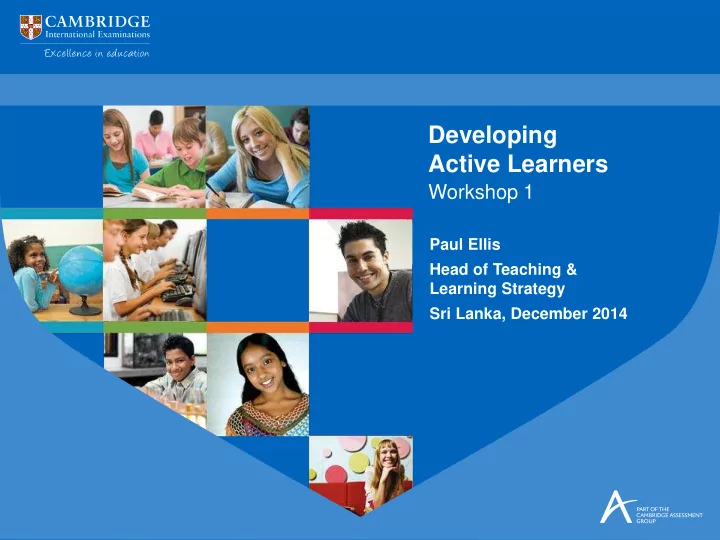

Developing Active Learners Workshop 1 Paul Ellis Head of Teaching & Learning Strategy Sri Lanka, December 2014
Active learning What do you understand by the term “active learning”? What is it not?
Traditional vs. constructivist Transcribing Discussing Accepting Appraising Solo studying Collaborating Recalling Applying Being right Empathising
If I use a constructivist approach: What do I need to understand about my pupils? What teaching strategies would I need to employ? What kind of learning culture for my pupils and myself do I need to develop? What kind of learning environment would support my pupils learning?
Fixed Mindsets Teachers with fixed mindsets often give low achievers less demanding work to ensure that they succeed. What are the consequences of this for the pupils? How is it better for the pupils to have teachers with a growth mindset?
Fixed Mindsets I have a certain amount of fixed intelligence and that’s that I feel clever when things are easy and I put in little effort and outperform my peers I don’t want my inadequacies and errors revealed I will not be able to cope with a problem or obstacle.
Growth Mindsets I can increase intelligence through my own efforts I acknowledge there are differences in others regarding how much they know and how quickly they master something I love to learn something new I am excited by challenge I feel clever when...
How to develop resilient learners 1. Create a secure learning environment 2. Don’t provide the answers 3. Give meaningful feedback, rather than grades 4. Build a community in your classroom 5. Model persistence 6. Display a positive attitude 7. Model flexibility 8. Let them fight their own battles 9. Differentiate 10. Don’t make all the decisions.
Scaffolding
Socialising
Stretching
Planning active learning for your lessons Scaffolding School/staff/teacher attitude Knowledge Classroom culture & Language learning environment Socialising “Developing an informed curiosity & Behaviour lasting passion for learning.” Tools Stretching Confident Responsible Applying Reflective Innovative Innovating Engaged
I hear and I forget, I see and I remember, I do and I understand. Confucius
The most exciting phrase to hear in science, the one that heralds new discoveries, is not Eureka!, but rather, “hmmm… that’s funny…” Isaac Asimov
If I ran a school, I’d give all the average grades to the ones who gave me all the right answers, for being good parrots. I’d give the top grades to those who made lots of mistakes and told me about them and then told me what they had learned from them. Buckminster Fuller
Recommend
More recommend